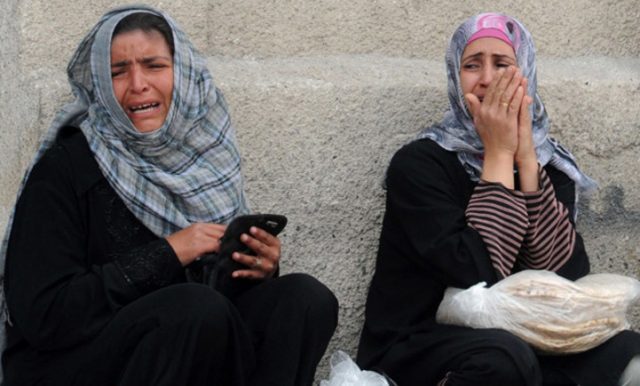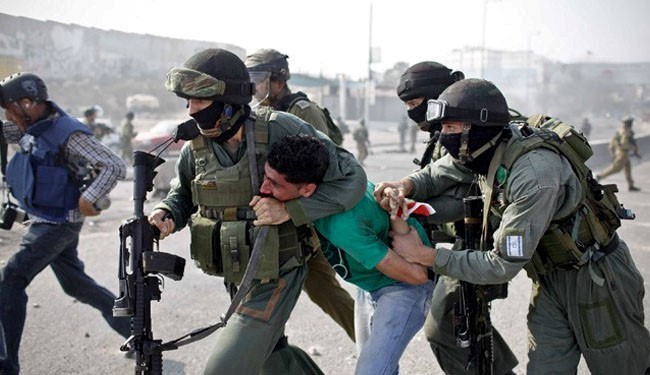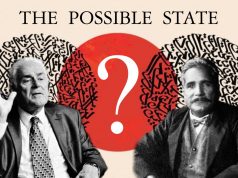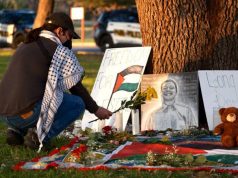The identity and history of Palestine are highly complex, with fiery issues as the world sees them, and involves the United Nations and its permanent members and many other countries directly or indirectly, for the sake of peace. Since the issue of Palestine took a volatile in nature the US, Britain, Saudi Arabia, Egypt, Iraq, even many Non Allied Movement (NAM) countries were involved to sort out this burning issue. Even international policy makers are looking at Palestine politically and others aim for religious angles, which is also not politically correct, because of its complexities. In the current political scenario of the world, this issue of Palestine’s existence cannot be ignored, as there are continuous violations of human rights, child abuse and UN resolutions. We need to look then at the entire issue sincerely to resolve it, and peace can be predicted in the entire region and across the world once Palestine is understood and accepted. This is not a religious issue only, but also a political issue. The World which have a stake in power (US, Europe and other developed countries) is trying to find an amicable solution, but fails to draw a concrete peace plan and formula, which is acceptable to all parties.
The number of plans and peace accords come transversely time to time, but hardly implemented completely, and the situation has still remained unchanged. During the period of Yassir Arafat Palestinian Liberation Organization, the situation was far better. Arafat was not only Palestinian leader, but a great charismatic leader of the Arab World as well, and he was able to handle critical situations, even had played a crucial role to get the support of the Arab and non Arab leaderships for the Palestinian cause. After his death by the poison, nothing seemed positive, but the leadership involved in more complexities and hardly concentrated on the PLO main objective which the PLO setup for.
Historical war of Jerusalem and Palestinian approach
There is no doubt that extremism and Jihad are falsely associated with only Muslims, and Palestinians are one of the most recent victims of that notion as seen by the West. Jerusalem had been conquered by the Muslims during the time of the second Caliph of Islam, Umar in the late 637 and later during the time of Salahuddin Ayyubi in the 1187, there seemed to be very little if anything of extremism and fanatical approaches. In reference to the Jerusalem issue, a contemporary account by a Christian witness recorded the atrocities against Muslims, noting that at the Temple of Solomon, “men rode in blood up to their knees and bridle reins.” But during the Sultan Salahuddin Ayyubi who defeated the Christians in Third Crusade in 1187, he allowed the defeated Christian soldiers to leave the city in peace on payment of ransom but those who could not pay were allowed to go without. He treated Christians and Jews with great tolerance. Here I would like to say that the situation which Israeli state created to discredit the PLO and its fractions in the eye of Palestinian and outside world is an issue of concern.
Post 2006 Election and new Political Development
The complex political situation created a rift within the PLO, and created Hamas in 1987 just after the First Intifada (1987-1993). No doubt that Fatah and Hamas had their own political positions, despite their goal of a free Palestine. Due to growing tension worldwide because of recent terror attacks around the world, Islamophobia and hatred have grown in the West and elsewhere, casting a shadow over the Palestinian issue completely. The Arab World is no less responsible for that, because of their internal conflicts and ego clash with each other and did not take the responsibility of its First Qibla of Islam collectively. In the process of time, the political complexities and the extensive Israeli pressure, brutality against the Palestinian people forced few of them to think differently on radical lines.
The creation of Hamas itself was a new idea to resist the Israeli occupation and get the Palestinian land free. Israel tried their best to divide the Palestinian leadership to weaken the resistance movement. In the second Palestinian Legislative Council (PLC) election in 2006, in which Hamas emerged as one of the leading political power secured 74 seats out of 132, Fatah won just 45. This is the clear indication that the PLO is divided and Fatah is loosing its grip on the masses, but the Israeli and other foreign powers did not want to hand over power to a radical group Hamas. Gaza fell into Hamas control, but the West was behind Mahmoud Abbas and had continued to support him. So, after the huge victory of Hamas formed a government which was not recognized by the world powers, even boycotted by West. Even American state department criticised the Hamas and its leadership, supported secular Fatah instead of the radical Hamas led by Ismail Haniyeh. Most of the countries were in favour of unfrozen the tax money to the PLO, even the US was in favour of that and asked Israeli Prime Minister Ehud Olmert to release money to Fatah, the secular faction of the PLO. The differences were high between these two groups of the PLO, Hamas had accused that, Fatah is acting as a Washington stooge in the region.
The Western donors and the U.S. cut off funding to the Hamas government shortly after the announcement of his government in Gaza. This is also true that the US put aside $42 million fund after Hamas won the election in January 2006. The earlier discussion was about a two state solution of this issue which is also not looking feasible due to the rigidity of most of the ministers of Israel despite their Camp David to Oslo journey for the peace in the region and for the people of the both countries. Finally, this new idea of two state solution is useless to talk, because most of the Israeli minister believes in the occupation and continued suppression and brutality of the Israeli state against the Palestinian.
The Current Scenario inside Palestine
The current situation in Palestine is a bit different from the previous, as now Fatah and Hamas have realized that nothing will be changed until they reach a unitary point and both agree to certain point which ensues towards peace and tranquility within the PLO. In the December last year the United Nations Security Council (UNSC) adopted a Resolution No 2334 which passed 14-0 and Russia voted in the favour of that, even the US abstaining was a big victory for Palestine. The Resolution 2334 says that Israeli settlements in the West Bank and Jerusalem were illegal, which is a shock for Israel, which at present has 196 illegal settlements on the West Bank and recently announced 300 more new houses in Jerusalem in the coming days on the illegally occupied Palestinian land.
Actually the UN resolution was first drafted by the Egyptian and wanted to put for the discussion, but the Al-Sisi was telephoned by Trump and suddenly he withdrew the draft resolution. Later the resolution was again put forward for the discussion by the other UN members like New Zealand, Malaysia, Venezuela and Senegal, a day after Egypt withdrew from Cairo’s earlier stand to put it on the UN table, but failed to do it due to heavy pressure from US president Donald Trump and Israeli leader Benjamin Netanyahu. The Palestinian chief negotiator Saeb Erekat expressed his joy with these words “this is a day of victory for international law, a victory for civilized language and negotiation and a total rejection of extremist forces in Israel,” to a reporter of Reuters news agency.
The recent Israeli stand against the Palestinian people is more devastating, the situation in West Bank and Gaza is getting more brutal. The new settlements are going on without listening the world or even neglected the UN. The vision of current Israeli regime is to just ignore the voices which are coming outside in support of Palestinian. The land which belongs to Palestinian is confiscated on the daily basis. The brutality, killing of innocent and kidnapping of children have been going on. The story is different for those who are under the Israeli jails. Hundreds of Palestinian prisoners are on hunger strike inside Israeli jails due to the bad captivity conditions. The hunger strike started after one of the Fatah prisoner Marwan Barghouti and other factions of the PLO like Hamas and Islamic Jihad also joined with other hundreds of prisoners. This hunger strike is supported by Hamas leaders of Gaza and Palestinian Prime Minister Rami Hamdallah. In the statement, Hamas categorically warned Israel and said that “we warn the Israel Prison Service against bringing any harm to the hunger strikers. Any delay in answering their just demand will explode the situation inside all prisons. All prisoners will unite in the face of all those who might harm prisoners and their dignity”.
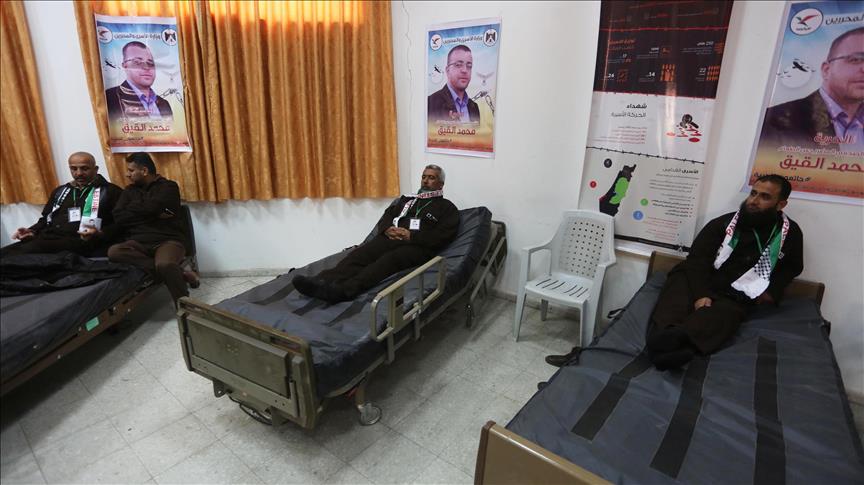
Those who are on hunger strike include many men, women and children, as per the Palestinian Prisoners Club, a support group for Palestinian detainees, there are some 6,500 Palestinian prisoners today, among them 56 are women of which 10 are younger than 18. In the coming days the numbers of strikers will increase because Palestinians are observing their 50 anniversary of occupation of Palestinian territory which captured after 1967 Arab-Israel Six day war. This year the Palestinians are remembering 100 years of the Balfour declaration and 50 years of the occupation. In the 100 anniversary of the Balfour declaration, which paveed the way for the Israel creation, Palestinian authority demanded an apology from the British government, which was rejected by the British foreign office and said about Balfour Declaration that “an historic statement” but also said that Britain continued to work for and Israel-Palestine peace agreement.
During the annual address of the UN General Assembly in September session the Palestinian President Mahmoud Abbas urged Britain for the apology but Britain plans to hold celebrations along with Israeli officials to mark the 2nd November anniversary of the Balfour Declaration. Palestine was under the British rule when British Foreign Secretary Arthur Balfour made the policy statement in a letter to Lord Rothchinld, a Jewish community leader in Britain. Palestinians have condemned the document as a promise by Britain to hand over land that did not own, because the British army that time did not enter into the Palestinian land. So the situation will be continued volatile from June to till the end of November this year. The communication between the Israeli and Palestinian last happened in 2014, in the absence of dialogue the situation turned into more hostile and critical phase. The first meeting of Abbas with President Trump happened on May 3, 2017, the first meeting and after the long gap of 3 years there is hope that dialogue for the peace between Israel-Palestine will start very shortly. This is the new test for Trump to prove that he is positive towards peace despite his inclination towards Tel-Aviv. Trump called Israeli President Netanyahu in February. Now this time he called the Palestinian President Mahmaud Abbas, there is hope that the White House is hopeful to extend peace in the region through dialogue between these leaders. As per the reports, American presidents are ready to break the tenets US policy holds for decades. The White House press secretary Sean Spicer also said “The president’s ultimate goal is to establish peace in the region”. But there is another remark coming from the US Vice President Mike Pence side, he said Trump is still “giving serious consideration to moving the American embassy in Tel Aviv to Jerusalem”, a move of such step would spark Palestinian anger widely across the World.
Recent Hamas Charter Amendment Issue
The recent new development happened in Qatar’s capital Doha regarding the amendment in the Hamas charter which was written during the initial days of 1988, now modified due to the current circumstances across the world. Hamas has now officially recognized the PLO as the ‘national framework’ for the Palestinian people, but urged to rebuil on democratic foundations to safeguard Palestinian rights. In the new official Hamas reference document calls for PLO to rebuild its state, which is looking a soft stand towards the unity and hardship for Israel.
The documents also said about the two state solution, as Hamas refuses to recognize Israel, or ‘any alternative to full and complete liberation of Palestine from the river to the sea’, it even also rejects the Oslo accord and all agreements that curtail freedom for them. It also stressed on the 1967 borders, with Jerusalem as its capital and return of refugees to their homes as a new formula of national consensus for the peace. This new document will be subject of internal debate within the Palestinian and Hamas as well.
So the new Hamas documents also talked that the conflict is with Zionist project not with the Jews because of their religion. The Israel categorically rejected this document. This is the new change since the First Intifada started and will be beneficiarl for the Palestinian.
Conclusion
These are the few points to note how the Arab World is failure to handle the Palestinian issues which is the core issue for them? The whole peace process was nothing but a bunch of half lie and the differences within the Arab leadership domain derailed the highly motivated and intelligent Palestinian generation. Their social, political and economic problems including the collateral damage were due to the apathy of unity among the Arab leadership despite their strong Arab League, the GCC, OIC and the majority Muslim members of OPEC.
There is no doubt that the aftermath of Yassir Arafat in 2004 we see a new vacuum in the Palestinian leadership despite the new leadership led by Mahmaud Abbas took the office, which is known as Abu Mazzin hardly understood the complexities of the ground situation. He is head of Fatah, which has a majority in PNA but his population decreases day by day due to unsatisfactory engagement with Hamas and Israel. Now in public spheres there is a rumour that he is not able to handle the situation because of his old age, and the new generation wanted to take the command of leadership into their hand. There is a real scarcity in the leadership between Fatah and Hamas and we can say whole PLO to understand the ground reality and the situation accurately in comparison to the Israeli leadership. Yes, there is hope that both factions are now ready to understand and nullify their ego and differences for the sake of unity and sacrifice of their people for last 69 years approximately. The recent charter amendment by Hamas is looking a new hope for the reconciliation of the PLO, which always had a different opinion and guided by two opposite forces in last 30 years, since the creation of Hamas in 1987. Now its onus lies on the leadership to handle the new friendly atmosphere and encash it for the fruitful purpose of the people of Palestine. Finally, the struggle of Yassir Arafat and his death by the poison nothing seemed positive, but we hope the coming days will be golden days for the Palestinians and their people, who have suffered for long. We would like to conclude by saying that during the long period of complexities PLO is a new path which will lead them shortly to their destination of “Free Palestine”.



